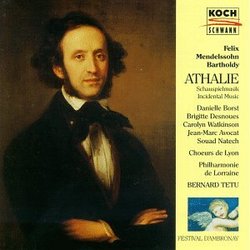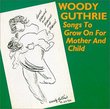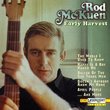| All Artists: Felix Mendelssohn, Philharmonie de Lorraine, Bernard Tetu, Danielle Borst, Brigitte Desnoues, Carolyn Watkinson, Jean-Marc Avocat, Souad Natech Title: Mendelssohn: Athalie / Borst, Desnoues, Watkinson, Avocat, Natech; Tetu Members Wishing: 0 Total Copies: 0 Label: Koch Schwann (Germ.) Release Date: 1/24/1995 Genre: Classical Style: Number of Discs: 1 SwapaCD Credits: 1 UPC: 099923142829 |
Search - Felix Mendelssohn, Philharmonie de Lorraine, Bernard Tetu :: Mendelssohn: Athalie / Borst, Desnoues, Watkinson, Avocat, Natech; Tetu
 | Felix Mendelssohn, Philharmonie de Lorraine, Bernard Tetu Mendelssohn: Athalie / Borst, Desnoues, Watkinson, Avocat, Natech; Tetu Genre: Classical
|
Larger Image |
CD DetailsSimilar CDs
Similarly Requested CDs |
CD ReviewsFine French Performance of Rarely Played Mendelssohn Nicholas A. Deutsch | New York, NY USA | 06/15/2004 (5 out of 5 stars) "If you love Mendelssohn's music, and specifically his incidental & choral music, I suggest you buy this rare CD immediately.
Jean Racine's 1691 play "Athalie" was one of 2 Biblically derived plays ("Esther" preceded it) written for the Parisian girls' school of Saint-Cyr. Both plays are consciously modeled on the ancient Greek tragedy, with its central role for the chorus, and so music plays an integral part in the progress of the drama. "Athalie" has attracted fine composers, starting with Jean-Baptiste Moreau (1656-1733) for the play's premiere in 1716; it served as the basis for Handel's 3rd English oratorio, "Athalia"; and both Mendelssohn and the great 20th century Swiss composer Frank Martin (in 1949) set Racine's original French text, Mendelssohn ultimately for mixed chorus, Martin, like Moreau, for girls' voices. This is mature Mendelssohn, written at a high level of inspiration. The only excerpts one occasionally hears (or used to) are orchestral: the Overture and the so-called "War March of the Priests." These are fine and characteristic pieces; but for me the real glory of "Athalie" lies in the extended and elaborate choral odes, where Mendelssohn had some really first-rate French verse to set. I would rank this piece just after "A Midsummer Night's Dream" in interest, certainly ahead of Mendelssohn's other incidental music ("Oedipus at Colonnus," "Antigone" - both now available on Capriccio). It really deserves to be heard more often. The present CD, so far as I know the only one ever issued of the original French version, is of a live performance at the Ambronay Festival in Metz, in 1993. It is a very good one, in reverberant but focused sound, featuring fine work from the Lyon Chorus and the Lorraine Philharmonia under Bernard Tetu. The soloists form a generally solid team. It's "traditional" Mendelssohn in the best sense: big-boned and weighty (but never sluggish), projecting genuine musical and spiritual grandeur. Apart from some necessary spoken text in the latter stretches of the drama, there is only one brief portion of speech near the start. English notes, but sung texts in French only. The only alternative recording [Capriccio 67 068] is also of interest, and very different in a number of significant ways. First, it's performed in German (as "Athalia"), with lengthy spoken narration written by the actor-singer Eduard Devrient (these have historical authority, but I prefer the original French text, and the narration is overlong). Second, it's a "period instrument" performance: both the sounds and the speeds (generally noticeably swifter) present the music in an often startling new light. Extensive notes, full German, French and English texts. Perhaps one day some British ensemble will record the piece in the English-language concert adaptation by W. Bartholemew, another version with historical standing... Meanwhle, snap this up!" |

 Track Listings (10) - Disc #1
Track Listings (10) - Disc #1


![Seussical [2000 Original Broadway Cast]](https://nationalbookswap.com/cd//m/02/4802/514802.jpg)